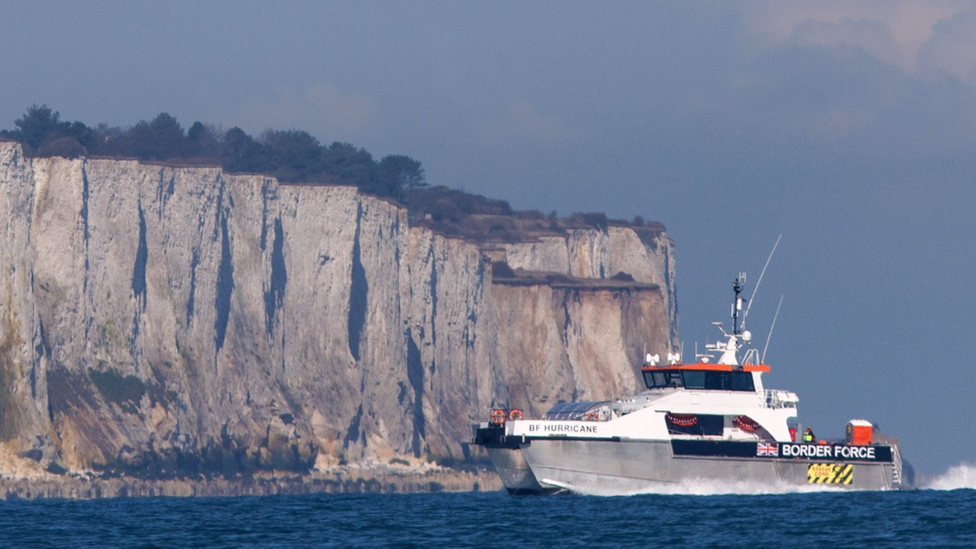Rishi Sunak‘s Rwanda bill will finally become law after a parliamentary showdown ended late in the night.
Plans to send some asylum seekers to Africa have met with fierce criticism, but the bill passed on Monday when the Lords dropped their opposition.
Mr Sunak said in a statement “nothing will stand in our way” now of getting flights off the ground.
But the scheme could still be held up by challenges in the courts.
Ahead of the bill passing, the prime minister said flights to Rwanda would take off within 10 to 12 weeks, missing his original spring target.
In a statement on Tuesday, he called the passing of the Rwanda Bill “not just a step forward but a fundamental change in the global equation on migration”.
He said: “We introduced the Rwanda Bill to deter vulnerable migrants from making perilous crossings and break the business model of the criminal gangs who exploit them.
“The passing of this legislation will allow us to do that and make it very clear that if you come here illegally, you will not be able to stay.
“Our focus is to now get flights off the ground, and I am clear that nothing will stand in our way of doing that and saving lives.”
But shadow home secretary Yvette Cooper called the Rwanda plan an “extortionately expensive gimmick”.
Charities have also hit out at the scheme, with leading human rights groups describing it as a “breach of international law”.
The government plans have been stymied since November, when the UK Supreme Court ruled unanimously that the Rwanda scheme was unlawful.
On Monday, the prime minister said flights were booked to take off as soon the legislation was passed and 500 staff were ready to escort migrants “all the way to Rwanda”.
“Plans are in place. And these flights will go, come what may,” he said, adding he wanted to create “a drumbeat of multiple flights a month… because that’s how you build a systematic deterrent and that’s how you’ll stop the boats”.
A gruelling parliamentary back-and-forth between the Commons and House of Lords saw the bill sent back to MPs five times before coming to an end.
After so many setbacks, the passing of the bill was a political win for the prime minister.
But his pledge to stop small boats crossing the channel now hinges on this being the deterrent he has promised. With a general election close, the prime minister does not have long to prove his plan will work.
By Monday peers were debating two amendments to the bill, the first was for an independent monitoring committee be set up to consider if Rwanda was safe and a second for exemptions for Afghans who had assisted the British military.
On the bill, Lord Carlile said: “This is something which is ill judged, badly drafted, inappropriate, illegal in current UK and international law, and the House of Lords is absolutely right to say that we want to maintain our legal standards in this country, and there are better ways of dealing with this problem anyway.”
‘An extremely important concession’
Lord Browne of Ladyton, who put forward the amendment to exempt Afghan veterans who had assisted the British military from deportation, said there had now been a concession by the government on this.
The government pledged that Afghan veterans with a “credible link” to the Afghan special forces would have their claims reassessed by an independent body and said those with verified claims would not be deported.
Lord Browne said this was “extremely important” concession” and dropped his amendment.
Back in the Commons, shadow immigration minister Stephen Kinnock praised the “tenacity” of his colleagues in the Lords for holding out for what he also called “a significant concession”.
But the government held firm on its rejection of the final amendment for a monitoring committee – put forward by crossbench peer Lord Anderson.
He said the purpose of the back-and-forth between the chambers was to persuade the government to agree a compromise but it had “refused pointedly to do so”.
The time had come to acknowledge the “primacy of the elected house and to withdraw from the fray”, he added.
Defending the bill, Home Office minister Lord Sharpe of Epsom said it complied with international law and that it was was “profoundly moral and patriotic to defend the integrity of our borders”.
Royal Assent is expected to be given by King Charles in the next few days, officially passing the bill into law.
It is not just opposition parties who have objected to the government’s Rwanda plan, with human rights groups saying the plan poses a “significant threat to the rule of law” by undermining what protects people from an abuse of power by the state.
The charity Freedom from Torture, alongside Amnesty International and Liberty said in a statement: “We all deserve the chance to live a safe life, and to seek protection when we need it most.
“This shameful bill trashes the constitution and international law whilst putting torture survivors and other refugees at risk of an unsafe future in Rwanda.”
Reform UK’s leader Richard Tice said the plan would not act as a deterrent, and even if flights to Rwanda leave in 10 to 12 weeks, “thousands more are going to arrive, they’re going to take their chance”.
He said the only way to “stop the boats” was if Border Force “pick people up and take them back to France – that will break the business model and crucially stop people dying”.


